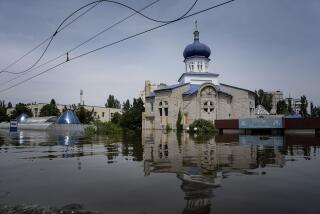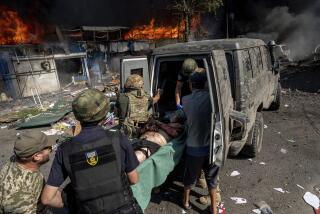The Erosion of Civilization
- Share via
Iraq sits along a stretch of land once so productive that the whole region -- which included present-day Syria, Iran and Jordan -- was known as the Fertile Crescent. In ancient times, the area led the world in agriculture and technology. It’s hard to reconcile that history with the reality of today, when the term “Infertile Crescent” would seem more appropriate.
The Fertile Crescent’s current desperation stands as testament to the steepest downturn of local fortunes since the end of the last Ice Age. For 8,000 years Iraq and its neighbors led the world as the source of most things embodied in the term “civilization.” Technology, ideas and power flowed outward from Iraq to Europe and eventually to America. Iraq’s decline holds lessons the world should heed.
The region’s ancient dominance didn’t arise from any biological superiority of its people, just as America’s dominance today has nothing to do with our own biology. Instead, Fertile Crescent peoples profited from an accident of biogeography: They had the good fortune to occupy the world’s largest zone of Mediterranean climate, home to the largest number of wild plant and animal species suitable for domestication. Until 8500 BC, all the world’s peoples obtained their food by gathering wild plants and hunting wild animals. Then the ancient Iraqis and other Fertile Crescent peoples began to develop farming and herding, domesticating wild wheat, barley, peas, sheep, goats, pigs and cows. Even today, these species remain the world’s staple crops and livestock. Agriculture fueled a population explosion, and also generated food surpluses that could be used to feed full-time professional specialists, who no longer had to devote time to procuring their own food.
These specialists fed by agriculture included smiths and metal workers, who developed the world’s first copper tools around 5000 BC, bronze tools around 3000 BC and iron tools around 1500 BC. The specialists also included accountants and scribes, who developed the world’s first writing system around 3400 BC. That was a huge head start: Writing didn’t reach what is now the United States until 5,000 years later. It makes Iraq’s current rate of illiteracy an especially cruel irony.
Agriculture also fed politicians, bureaucrats and judges. That’s why the world’s first states arose in Iraq around 3500 BC, and the first multiethnic empire arose there around 3000 BC. The Middle East continued to lead and dominate western Eurasia for several thousand more years, and its languages were spoken from Ireland to India. The English we speak today grew out of the Indo-European languages originally spoken by Middle Eastern peoples, and the fact that people in the United States speak it -- as opposed to a language derived from ancient Algonquin or some other Native American language family -- is a testament to the Middle East’s ancient dominance.
So how did Fertile Crescent peoples lose that big lead? The short answer is ecological suicide: They inadvertently destroyed the environmental resources on which their society depended. Just as the region’s rise wasn’t due to any special virtue of its people, its fall wasn’t due to any special blindness on their part. Instead, they had the misfortune to be living in an extremely fragile environment, which, because of its low rainfall, was particularly susceptible to deforestation.
When you clear a forest in a high-rainfall tropical area, new trees grow up to a height of 15 feet within a year; in a dry area like the Fertile Crescent, regeneration is much slower. And when you add to the equation grazing by sheep and goats, new trees stand little chance. Deforestation led to soil erosion, and irrigation agriculture led to salinization, both by releasing salt buried deep in the ground and by adding salt through irrigation water. After centuries of degradation, areas of Iraq that formerly supported productive irrigation agriculture are today salt pans where nothing grows.
Once the Fertile Crescent began to decline for those environmental reasons, hostile neighbors helped speed the process. The original flow of power westward from the Fertile Crescent reversed in 330 BC, when the Macedonian army of Alexander the Great advanced eastward to conquer the eastern Mediterranean. In the Middle Ages, Mongol invaders from Central Asia destroyed Iraq’s irrigation systems. After World War I, England and France dismembered the Ottoman Empire and carved out Iraq and other states as pawns of European colonial interests. As the end product of this history, the former world center of wealth, power and civilization is now poor in everything except oil. Iraq’s leaders ensured that few benefits of that oil reached their people.
Iraq’s decline holds a broader significance. Many other countries today face similar crippling environmental problems, including the deforestation, overgrazing, erosion and salinization that brought down the Fertile Crescent. Other countries already crippled or nearly so by such problems include Haiti, Somalia, Rwanda, Afghanistan, Pakistan, Nepal, the Philippines and Indonesia.
You may well detect a similarity between this list of looming environmental disasters and the CIA’s list of overseas trouble spots, places prone to civil wars and violent regime changes -- places to which we often end up dispatching U.S. troops. Those two lists are related by cause and effect. When environmental damage makes people economically desperate, they are likely to suffer from poor health and short life spans, blame their governments, kill each other, end up with crazy leaders and seek to immigrate illegally to more favored landscapes.
The First World can respond to these Third World problems in one of three ways. It can provide humanitarian aid once a crisis has arisen. It can ignore the situation as long as possible and then intervene militarily once the crisis cannot be ignored (at a cost, in the case of Afghanistan and Iraq, of an estimated $100 billion per intervention when you add up all the potential costs of military action and rebuilding). Or it can intervene before a crisis to stave off looming problems.
There are lots of other countries teetering on the brink. We will be hearing more from Bangladesh, Haiti, Nepal, Indonesia and others. Even for a country as wealthy as the United States, there is a limit to the number of $100-billion interventions we can afford, and there are many alternative uses at home for that money -- improving our schools, say, or fixing Social Security or establishing universal health insurance.
The most effective and least expensive approach would be to help Third World countries solve their basic environmental and public health problems before they cripple societies. The cost of a global program to combat AIDS, malaria and tuberculosis -- the world’s three most costly infectious diseases -- is estimated by public health organizations at about $25 billion, or one- quarter the cost of a single military intervention.
Attacking problems before crises is a policy that differs in motivation (though not in policies pursued) from a traditional humanitarian response that comes out of a moral commitment to address crises. Its motive is selfish. Preventing chaos abroad benefits the United States. President Bush would be on the right track with his policy of preemption if he were aiming at preempting crises, rather than at preempting military aggression.
In today’s globalized world, any country can pose a threat: Just look at Somalia and Afghanistan, which rank among the poorest, weakest, most isolated countries on Earth. We can’t take on the whole world militarily. Keeping weak countries from getting into the kind of trouble Iraq found itself in would ultimately save the U.S. money -- and generate global political capital.
More to Read
Sign up for Essential California
The most important California stories and recommendations in your inbox every morning.
You may occasionally receive promotional content from the Los Angeles Times.













